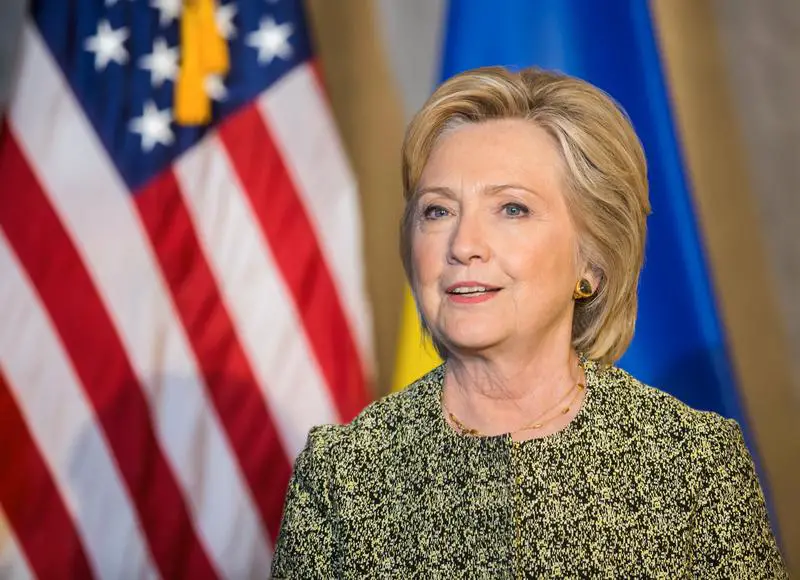Hillary Clinton, former Secretary of State, has expressed concern about a potential disinformation campaign targeting Vice President Kamala Harris. In a recent discussion with Firing Line host Margaret Hoover, Clinton warned of increasing efforts to tarnish Harris’ public reputation. She dubbed these disinformation tactics as an “October surprise,” and suggested they would be used to distort and malign Kamala Harris in an attempt to manipulate public sentiment ahead of the election.
Clinton’s alert indicates a possible orchestrated disinformation campaign intended to misrepresent Harris’ character and political record. Based on her own experiences during the 2016 election, Clinton pointed out that these strategies often utilize conspiracy theories and false narratives to harm the reputation of political figures. She emphasized that Vice President Harris, being a high-profile figure, could be a prime target for such efforts as Election Day nears.
The former Secretary of State cited the now-discredited “Pizzagate” conspiracy theory as an example of the potential reach and danger of disinformation. This 2016 scandal wrongly linked her to a child trafficking ring operating from a Washington, D.C. pizzeria. This false narrative spread quickly across social media and obscure websites. “The crazy story about me running a child trafficking operation out of a basement of a pizzeria,” recalled Clinton, commenting on the absurdity of the allegations. The theory gained so much traction that it prompted a man from North Carolina to visit the pizzeria armed with an assault rifle, intending to “rescue” nonexistent children.
This incident underscores the real-world dangers of online misinformation. Clinton used this example to demonstrate how rapidly false information can spiral out of control, warning that a similar disinformation campaign could be implemented against Harris leading up to the 2024 election. “Don’t laugh,” Clinton advised, underscoring the gravity of such fabrications and how easily they can spread.
Clinton observed that the swift dissemination of these conspiracy theories is often facilitated by social media platforms and fringe news sites. “It starts online, often on the dark web,” she explained, describing how disinformation moves from hidden parts of the internet into mainstream conversation. Once these stories are picked up by partisan media outlets, they can rapidly spread, reaching a larger audience and acquiring undeserved credibility.
Beyond domestic disinformation, Clinton also highlighted the potential for foreign interference in the 2024 election, echoing concerns raised by cybersecurity experts. She suggested that countries such as Russia, Iran, and China could exploit social media platforms to disseminate false narratives about candidates, including Harris. “The digital airwaves will be filled with misinformation,” warned Clinton, emphasizing the need for vigilance in countering untruths.
In the 2016 election, Russian operatives utilized social media to propagate divisive narratives and disinformation campaigns, undermining trust in the electoral process. Clinton suggested similar strategies could be employed now, with foreign actors promoting narratives specifically targeting Harris. She argued that social media platforms must actively monitor and limit the spread of disinformation. Additionally, she emphasized the media’s role in maintaining a consistent narrative about the risks posed by false information.
Clinton stressed the need for journalists to be diligent in fact-checking and debunking misinformation before it becomes widely accepted. “The press needs a consistent narrative about the danger Trump poses,” she said. She also encouraged the public to remain skeptical of outrageous claims, particularly those seemingly designed to instill fear or doubt.
While Clinton admitted she doesn’t know the exact form the disinformation campaign against Harris might take, she expressed certainty that something will occur. She urged voters, the media, and political leaders to stay vigilant and be ready to counter any false narratives that might surface.
Traditionally, “October surprises” refer to last-minute revelations or scandals that can impact an election’s outcome. Clinton posited that Harris, being the first female vice president of color, could be particularly susceptible to disinformation campaigns that exploit biases and attempt to incite division among voters. She warned that these efforts might be part of a larger strategy to destabilize the political landscape by focusing on Harris’s race, gender, or past political record.
Clinton’s comments come at a crucial time as the 2024 election approaches and concerns about disinformation persist. Recent elections, domestically and internationally, have demonstrated the influential role false information can play in shaping public opinion and voter behavior.
CBS News recently reported on a disinformation campaign against Vice President Harris, led by actors linked to Russia, according to Microsoft. The campaign includes doctored videos falsely accusing Harris of involvement in a hit-and-run accident. Iranian and Chinese groups are also involved, seeking to disrupt the U.S. elections.
A video, which gained millions of views on social media in September, showed a young Black woman accusing Vice President Harris of leaving her paralyzed after a hit-and-run accident in San Francisco, California 13 years ago. However, inconsistencies in the video led to skepticism among social media users. Microsoft’s threat intelligence report confirmed that the fabricated story was disinformation originating from a Russia-linked troll farm.
“We’ve seen it before, and we’re seeing it again,” Clinton said, referencing her own experience in 2016. “This is dangerous stuff,” she reiterated, urging all Americans to be vigilant against attempts to distort the truth.











